Dextromethorphan for dogs is a common ingredient in many over-the-counter (OTC) human cough medicines, often found under brand names like Robitussin DM. While it’s widely used in people, dog owners sometimes wonder if it can also be given to their furry companions when they’re dealing with a nagging cough.
Technically, dextromethorphan is not FDA-approved for veterinary use. However, some veterinarians may recommend it under specific circumstances, particularly for dogs suffering from non-productive coughs that are not caused by infections or serious health issues. Think of it as a “cough suppressant” rather than a cure—it doesn’t treat the underlying cause, but it may provide relief in mild cases.
It’s important to note that just because a medication is available over-the-counter for humans doesn’t automatically mean it’s safe for pets. Dogs metabolize drugs differently, and certain formulations of human cough medicine contain harmful additives like acetaminophen, xylitol, or pseudoephedrine—each of which can be toxic to canines. That’s why a clear understanding of dosing and safety is critical before giving your dog dextromethorphan.
Disclaimer: This guide provides general educational information only and does not substitute professional veterinary care. Always consult your veterinarian before medicating your dog. Self-medicating pets can lead to severe illness or death.
Is Dextromethorphan Safe for Dogs?
The answer is: sometimes, but only with veterinary guidance. Dextromethorphan may be considered safe in controlled doses for otherwise healthy adult dogs with mild, dry coughs.
Please note that it can be toxic if overdosed or if accidentally ingested by your pet.
That said, there are several safety concerns to keep in mind:
- Potential side effects – These can include lethargy, upset stomach, vomiting, restlessness, or in rare cases, tremors and disorientation.
- Toxic additives – Many human cough syrups contain ingredients toxic to dogs. Xylitol (a common artificial sweetener) can cause life-threatening hypoglycemia and liver failure. Pseudoephedrine and acetaminophen are also extremely dangerous for dogs.
- Underlying health issues – If your dog’s cough is caused by heart disease, pneumonia, or kennel cough, suppressing it with dextromethorphan may delay proper diagnosis and treatment.
It’s also worth noting that puppies, senior dogs, and dogs with liver or kidney problems are at higher risk of adverse reactions. Because of these factors, veterinarians typically reserve dextromethorphan for very specific cases and advise against giving it without professional input.
Natural Dog Cough Suppressant & Cold Remedy
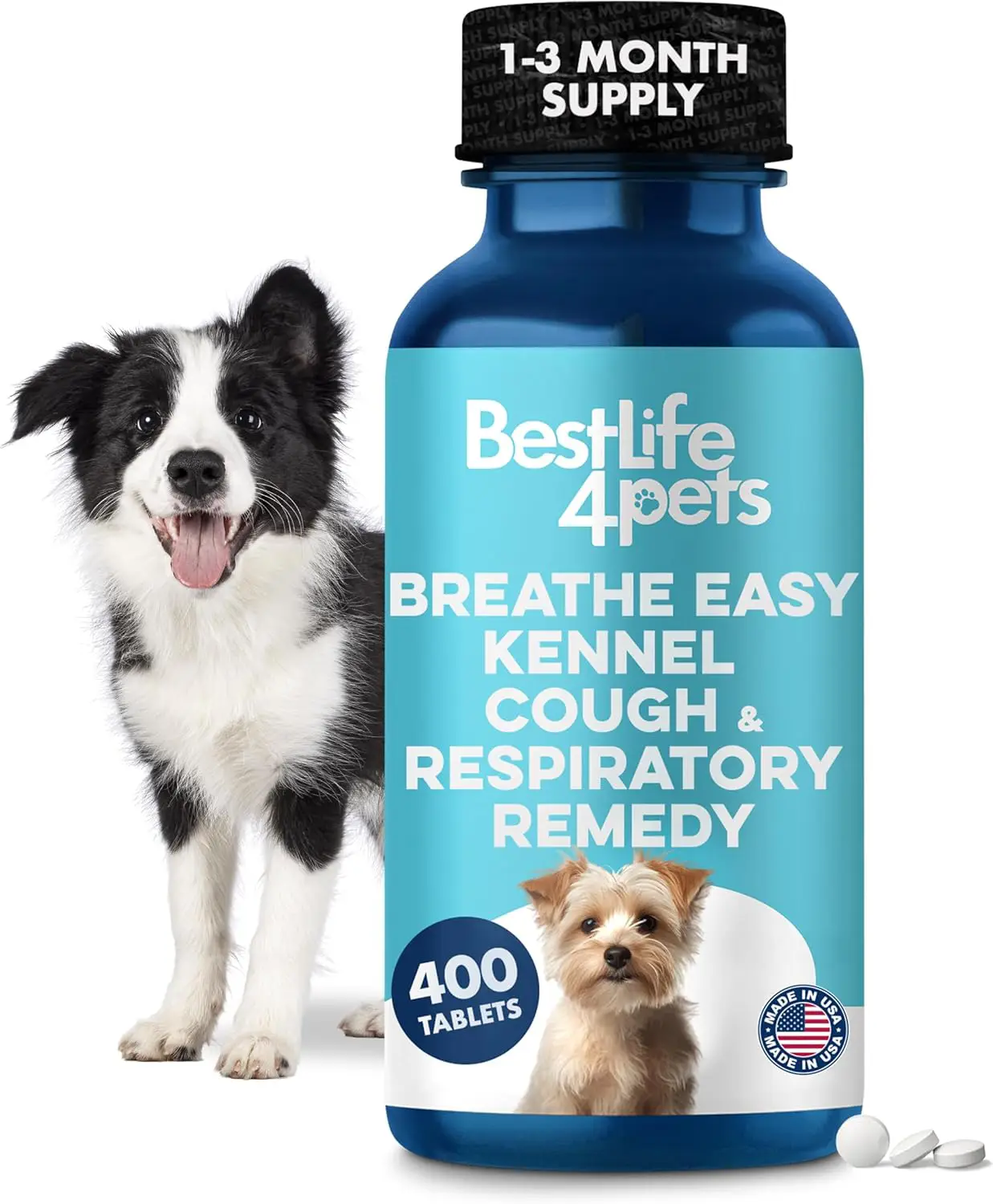
Dog Cough Medicine – 100% Natural
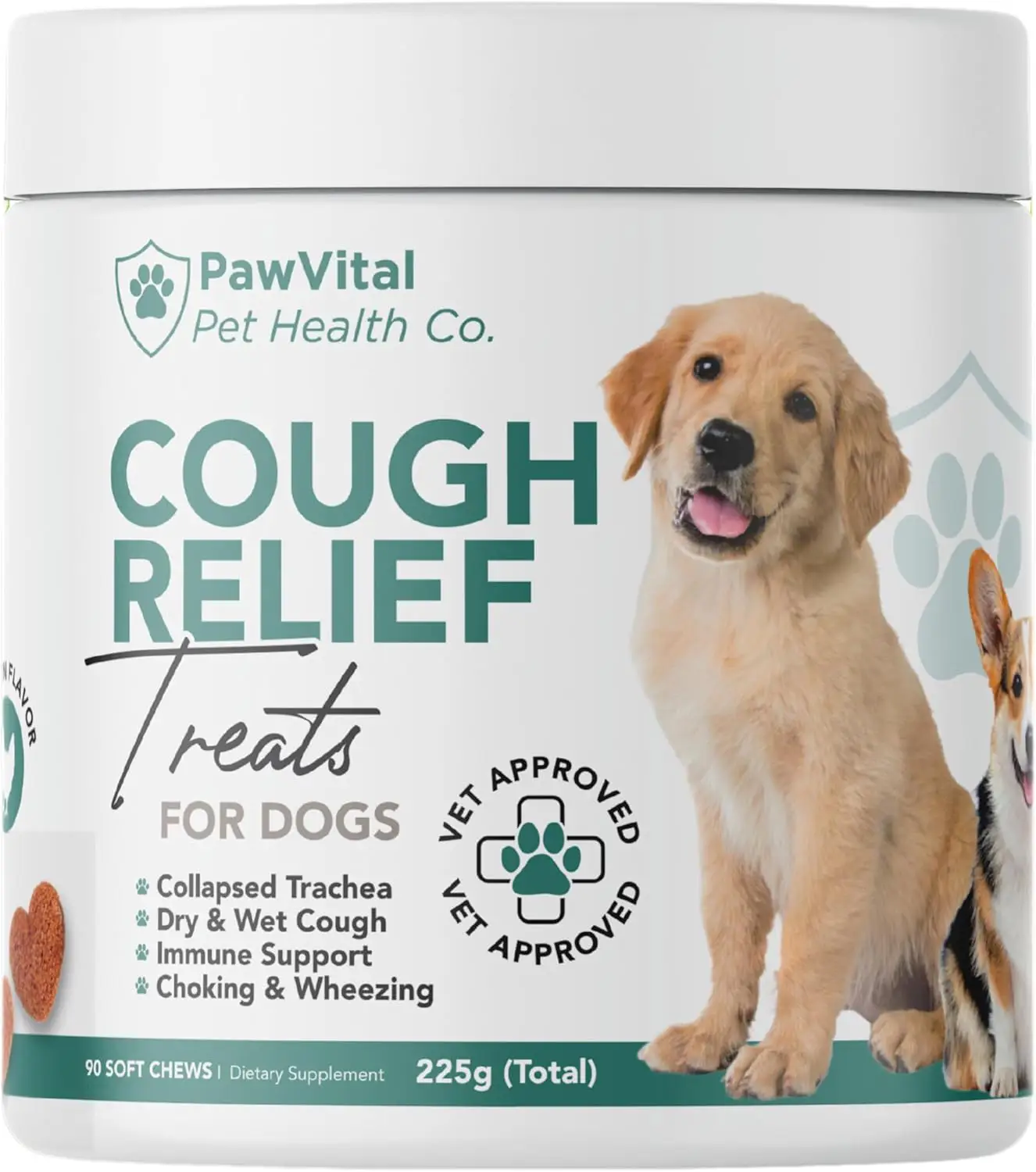
Dextromethorphan Dosage For Dogs
The recommended safe dosage of Dextromethorphan for dogs is 0.5–1 milligrams per kilogram orally every 8-12 hours. However, exceeding the safe dosage limit can be toxic and should be avoided. Always consult your veterinarian before administering this medication.
Dextromethorphan For Dogs Dosage Chart
| Weight (kg) | Weight (lbs) | Dosage Range (mg) per Dose | Notes |
|---|---|---|---|
| 2 kg | 4.4 lbs | 1.0 – 2.0 mg | Tiny breeds (e.g., Chihuahua) |
| 5 kg | 11.0 lbs | 2.5 – 5.0 mg | Small breeds (e.g., Toy Poodle) |
| 10 kg | 22.0 lbs | 5.0 – 10.0 mg | Medium breeds (e.g., Beagle) |
| 15 kg | 33.1 lbs | 7.5 – 15.0 mg | Medium-large breeds (e.g., Border Collie) |
| 20 kg | 44.1 lbs | 10.0 – 20.0 mg | Large breeds (e.g., Australian Shepherd) |
| 25 kg | 55.1 lbs | 12.5 – 25.0 mg | Large breeds (e.g., Labrador Retriever) |
| 30 kg | 66.1 lbs | 15.0 – 30.0 mg | Extra-large breeds (e.g., Golden Retriever) |
| 35 kg | 77.2 lbs | 17.5 – 35.0 mg | Giant breeds (e.g., Rottweiler) |
| 40 kg | 88.2 lbs | 20.0 – 40.0 mg | Giant breeds (e.g., German Shepherd) |
| 45 kg | 99.2 lbs | 22.5 – 45.0 mg | Giant breeds (e.g., Mastiff) |
| 50 kg | 110.2 lbs | 25.0 – 50.0 mg | Giant breeds (e.g., Great Dane) |
How Much Dextromethorphan (DMX) is Toxic to Dogs
| Size Category | Example Breeds | Weight Range (lbs) | Weight Range (kg) | Toxic Threshold (mg) | Toxicity Symptoms |
|---|---|---|---|---|---|
| X-Small | Yorkie, Chihuahua | 1–10 lbs | 0.45–4.6 kg | >0.9 mg | Lethargy, tremors, vomiting, respiratory depression |
| Small | Pug, Boston Terrier, Poodle | 11–25 lbs | 5–11.4 kg | >10 mg | Agitation, diarrhea, tachycardia, ataxia |
| Medium | Beagle, Scottish Terrier | 26–40 lbs | 11.8–18.2 kg | >23.6 mg | Seizures, hyperthermia, disorientation, dilated pupils |
| Large | Boxer, Cocker Spaniel | 41–70 lbs | 18.6–31.8 kg | >37.2 mg | Coma, arrhythmia, muscle rigidity, organ failure risk |
| X-Large | Retriever, German Shepherd | 71–90 lbs | 32.3–40.9 kg | >64.6 mg | Respiratory arrest, seizures, hypotension, death risk |
| XX-Large | Great Dane, St. Bernard | 91–110 lbs | 41.4–50 kg | >82.8 mg | Multi-organ failure, severe neurological damage, high fatality risk |
Signs of DMX Toxicity in Canines
- Involuntary muscle movements.
- Sedation
- Agitation
- Tremors
- Seizures
- Changes in heart rate (faster or slower)
- Increased body temperature
How Dextromethorphan Works in Dogs
Dextromethorphan works by affecting the brain’s cough center, specifically the medulla oblongata, which controls the cough reflex. Instead of targeting the throat or lungs directly, it reduces the urge to cough by dampening nerve signals in the brain.
In humans, this makes it effective for controlling nagging dry coughs caused by colds or throat irritation. In dogs, the same principle applies—it helps reduce coughing that isn’t tied to clearing mucus, infection, or serious lung conditions.
However, one big difference between humans and dogs is that dogs are more sensitive to drug metabolism. Their liver processes medications differently, which means they can experience side effects at lower doses. That’s why it’s dangerous to assume “if it’s safe for me, it’s safe for my dog.”
Veterinarians sometimes use dextromethorphan to provide short-term relief for coughs related to irritation, collapsing trachea, or mild airway inflammation. But if your dog has a wet cough, fever, or labored breathing, suppressing the cough could actually make things worse—since coughing is the body’s way of clearing out fluid and infection.
Administering Dextromethorphan Safely
If your veterinarian has approved dextromethorphan for your dog, the next step is making sure you give it properly. The way you administer it matters just as much as the dosage.
1. Liquid vs. Pill Form
Most human versions of dextromethorphan come in liquid syrups, but not all of them are safe for dogs. Many liquid cough medicines contain xylitol, alcohol, or acetaminophen, which can be toxic. If you must use liquid, only choose a product where dextromethorphan is the sole active ingredient and confirm with your vet before giving it.
Capsules or tablets are often a safer option because they don’t come with the added sweeteners or dyes that syrups usually contain.
2. How to Give the Medicine
- For liquid, use a syringe or dropper to measure the exact amount. Avoid guessing or “eyeballing” doses.
- For pills, you can hide them in a soft treat, peanut butter, or a small piece of cheese. Many dogs will happily swallow it without noticing.
- If your dog spits out the medicine, don’t try to force-feed immediately. Instead, wait a few minutes and try again with a different method.
3. Timing and Frequency
Dextromethorphan is usually given every 8 to 12 hours. Set a timer or reminder so you don’t accidentally give doses too close together, which can increase the risk of side effects.
4. Monitoring After Administration
After giving your dog dextromethorphan, watch for any unusual behavior—such as extreme sleepiness, agitation, or stomach upset. If symptoms appear, stop the medication and call your vet right away.
Safe administration isn’t just about following the chart—it’s about consistency, accuracy, and close observation of your dog’s response.
Dextromethorphan For Dogs: How Long Does It Take to Work?
Pet owners often want quick results, especially if their dog has been coughing nonstop. Thankfully, dextromethorphan usually works fairly quickly.
Onset of Action
Most dogs show improvement within 30 minutes to an hour after taking the medicine. The cough reflex becomes less frequent, and your dog may seem calmer and more comfortable.
Duration of Effects
The relief typically lasts about 6 to 12 hours, depending on the dosage and your dog’s metabolism. This is why vets usually recommend giving it twice or three times per day if prescribed.
Signs It’s Not Working
If your dog’s cough doesn’t improve within a day or two of correct dosing, it’s a sign that dextromethorphan may not be the right solution. In cases like kennel cough, heart disease, or pneumonia, suppressing the cough won’t help much and may even be harmful.
Another red flag is if the cough worsens or is accompanied by breathing problems, fever, or lethargy. In such cases, stop the medication and get veterinary help right away.
Think of dextromethorphan as a band-aid, not a cure. If it doesn’t make your dog more comfortable quickly, the underlying issue needs more targeted treatment.
Veterinarian Recommendations
Veterinarians generally approach dextromethorphan with caution. While they may prescribe it occasionally, it’s far from the first line of defense for a dog with a cough.
When vets may recommend it:
- For dogs with collapsing trachea, where coughing is frequent and disruptive but not infectious
- For dry, non-productive coughs that cause discomfort
- As a short-term solution while waiting for diagnostic results
When vets usually avoid it:
- If the cough is due to infection (like kennel cough or pneumonia)
- If the dog has heart disease or other chronic conditions
- If the dog is on other medications that may interact
Most vets prefer to use more targeted medications such as hydrocodone, antibiotics, or allergy treatments, depending on the cause of the cough. This way, the root problem is addressed rather than just silenced.
If your veterinarian does recommend dextromethorphan, it’s usually because they believe the benefits outweigh the risks in your dog’s specific situation.
Final Thoughts
Dextromethorphan can be a helpful cough suppressant for dogs, but only under the guidance of a veterinarian. While the dosage chart by weight provides a general guideline, it should never replace professional advice. The safety of this medication depends on your dog’s age, health conditions, other medications, and the cause of their cough.
Used correctly, it may provide short-term relief for mild, non-productive coughs. But remember—it’s not a cure. The real key is identifying and treating the underlying issue, whether it’s allergies, collapsing trachea, or something more serious.
When in doubt, call your veterinarian before reaching into your medicine cabinet. What helps you feel better during a cold could be harmful to your furry friend if given incorrectly.
You May Also Like To Read:
FAQs
Can I give my dog Robitussin with Dextromethorphan?
Only if your vet specifically approves it and the label lists dextromethorphan as the sole active ingredient. Many Robitussin products contain other dangerous ingredients.
How often can I give Dextromethorphan to my dog?
Typically every 8–12 hours, but only at the dosage your vet prescribes. Never give more frequently without veterinary approval.
Can puppies take Dextromethorphan?
Generally no. Puppies’ organs are still developing, making them more sensitive to medications. Safer alternatives should be explored.
What if my dog spits it out?
Wait a few minutes and try again with food or a treat. Don’t immediately redose—you could accidentally give too much.
Are there long-term side effects?
Dextromethorphan is not intended for long-term use in dogs. Extended use can cause liver strain, dependency, and masking of serious underlying diseases.
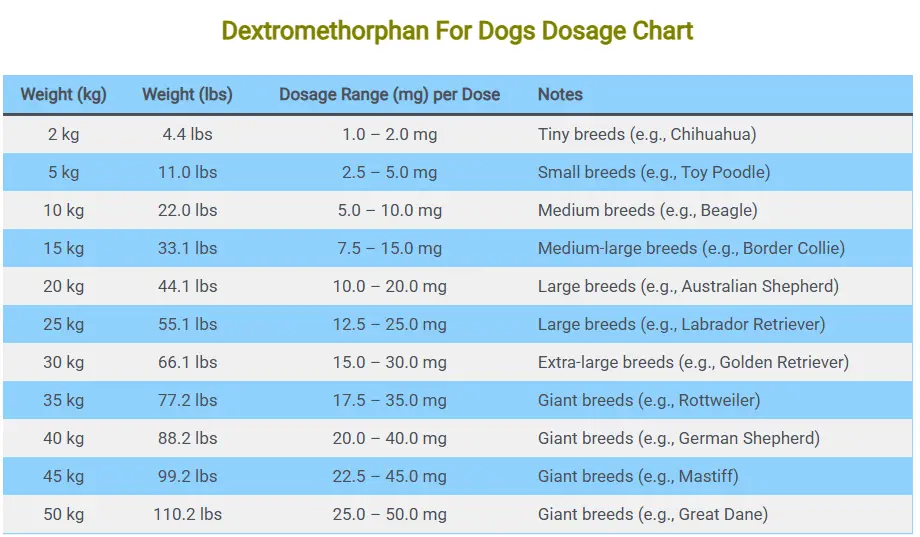
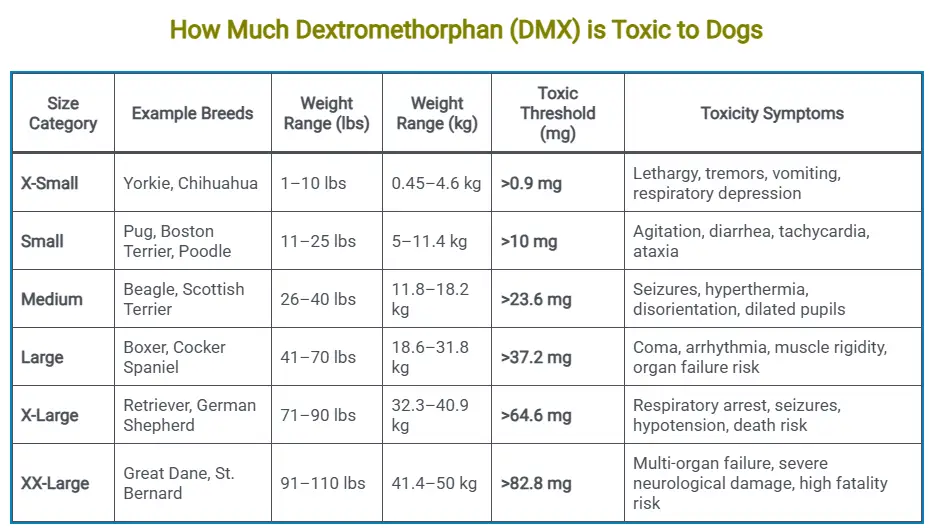



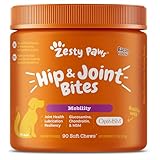






![Can Dogs Eat Blood? 7 Side Effects [Expert Opinion]](https://petskor.com/wp-content/uploads/2022/04/Webp.net-resizeimage-12.jpg)
